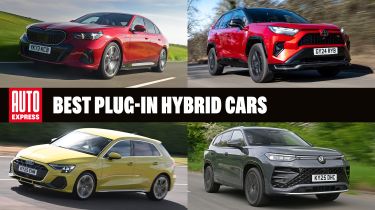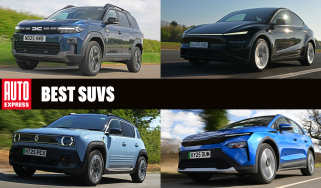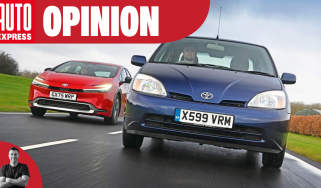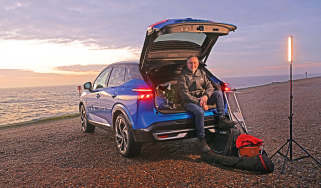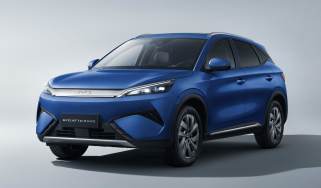Best plug-in hybrids to buy 2026
The plug-in hybrid market has grown exponentially in recent years. Here are our electrified favourites
For those not quite ready to make the switch to a fully electric car, plug-in hybrids (PHEVs) are a great ‘stepping stone’ option.
These cars combine a traditional internal combustion engine with electric power just like every other hybrid car. Unlike standard hybrids, plug-in hybrids can be charged via a plug just like an EV, while standard hybrids typically have a smaller battery and are charged through driving with regenerative breaking.
Thanks to their larger batteries and plug-in charging capability, many PHEVs now offer over 60 miles of electric range. Owners who can charge their car, and rarely exceed the electric range between charges, can use very little fuel.
On longer trips, there’s no range anxiety because you can use the internal combustion engine (ICE) and refuel as you would in a petrol or diesel car.
Plug-in hybrids might sound like the best of both worlds but as they have two powertrains, one petrol and one electric, they can be heavy and more expensive to buy compared to a pure ICE car.
This extra weight also negatively impacts fuel economy when the battery runs flat and you’re just using the ICE engine. This, alongside the higher starting prices means that plug-in hybrid tech tends to be offered in larger cars.
Our expert road testers have thoroughly tested every PHEV on sale in the UK, and using their in-depth verdicts we’ve rounded up the best plug-in hybrid cars to buy.
We’ve given you a broad cross-section of what’s on offer including the top models available of each type from SUVs and executive saloons, to hatchbacks and estates.
Top 10 Best Plug-In Hybrid Cars
1. BMW 530e
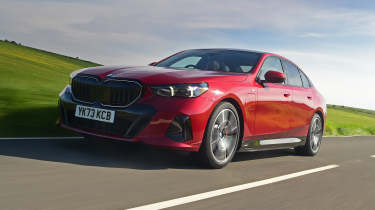
- Prices from £59,700
- Maximum pure-electric range: 64 miles
- Auto Express Premium Hybrid Car of the Year 2025
| Pros |
|
| Cons |
|
The BMW 5 Series has long been a staple of the company car and executive car worlds for more than 50 years, and this latest eighth-generation has gone big on electrification in order to meet the demands of its loyal customers. The move has certainly been successful, as the BMW 530e has been the Auto Express Premium Hybrid Car of the Year for two years on the trot now.
Thanks to its large 19.4kWh battery, the big brutish-looking saloon claims a pure-electric range of up to 64 miles, and in our testing we’ve seen it come incredibly close to that. When you’ve drained the battery, there’s a punchy 2.0-litre petrol waiting in the wings to make sure you reach your destination.
Sure it’s partly electric, but the 530e is just as enjoyable to drive as a 5 Series should be and offers peerless refinement. It’s equally impressive inside, too, where you’ll find a class-leading interior that’s very well put together, ergonomically designed and filled with top-quality tech.
Unfortunately, the 530e’s plug-in powertrain does come at a fairly sizable additional outlay compared with the purely petrol-powered 520i model, but its reduced running costs will help to mitigate this initial financial sting. If that’s no concern for you, the legendary BMW M5 has embraced plug-in hybrid power, so it spits out 717bhp but amazingly also manages to fall into the 9 per cent Benefit-in-Kind (BiK) company car tax bracket.
“The PHEV system has a slightly sluggish step off the line in its e-mode, so it doesn't feel as effortless as a BMW i5. Once rolling though, the 530e is staggeringly refined because of its ability to shuffle around in near-silence at town speeds.” – Alex Ingram, chief reviewer.
BMW 5 series reviewBMW 5 Series deals
2. Audi A3 TFSIe
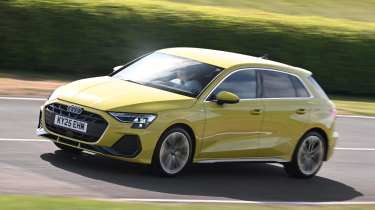
- Prices from £39,900
- Maximum pure-electric range: 88 miles
- Longest PHEV range
| Pros |
|
| Cons |
|
The Audi A3 has long combined family car practicality with a touch of luxury. Recent revisions have improved what was already a very good car, and now the Audi A3 TFSIe plug-in hybrid offers near-EV levels of cost efficiency; while retaining the safety net of an economical petrol engine.
With a starting price of just under £40,000, the Audi A3 TFSIe boasts one of the largest all-electric ranges of any plug-in hybrid currently on the market: up to 88 miles on the WLTP combined cycle. This isn’t a figure you’ll only see on paper, either, as we managed to match Audi’s range estimate and returned 3.8mi/kWh in EV mode after driving on a mixture of roads.
The A3 TFSIe is a very quiet and relaxing car to drive around town, with no noticeable jolt or noise when the petrol engine kicks in. The electric motor is peppy and quick to respond when travelling at low speeds. The revised suspension helps hide the extra weight of the PHEV system and isn’t overly harsh or wallowy when driving over rough road surfaces.
For a hatchback, the amount of space on offer is no better than average. Getting comfy up front is straightforward with lots of seat adjustment, and there’s enough space in the rear for two adults to sit comfortably. The boot offers 280 litres of storage, which is seven litres more than in the closely-related Volkswagen Golf eHybrid, but much smaller than the 361-litre boot capacity in the plug-in hybrid Peugeot 308.
“The Audi A3 TFSIe is fantastic, but if there was one wish, it would be the option of easier configurability to the plug-in hybrid system.” - Jordan Katsianis, senior staff writer.
3. Mercedes C 300 e
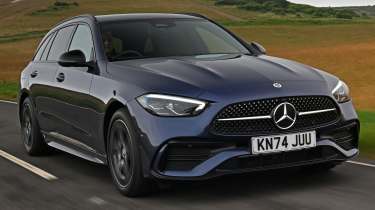
- Prices from £50,800
- Maximum pure-electric range: 71 miles
| Pros |
|
| Cons |
|
While in theory plug-in hybrids offer the best of both worlds, they often have to make concessions compared to their purely combustion-powered or electric counterparts. Not the Mercedes C 300 e though. The plug-in version of the long-serving Mercedes C-Class saloon offers a zero-compromise alternative for company car drivers who aren’t ready to go fully electric.
It looks and feels like any other C-Class, but a rather huge 25.4kWh battery means it’s capable of driving up to 71 miles without using a drop of petrol. You’ll have to cover quite some distance before waking the 2.0-litre engine, which is no hardship because the C 300 e is so comfortable and refined.
Its styling has been influenced by Mercedes’ flagship S-Class, as has the interior that feels almost as plush as the limousine’s. That car’s incredibly slick and intuitive MBUX infotainment system is fitted, too, displayed on a fantastic 11.9-inch touchscreen that’s standard on every model. In our latest Driver Power survey, C-Class owners held the car in high regard, where it was ranked as the fifth best car to own out of fifty, commending the infotainment usability, interior design and reasonable running costs.
“With a superb electric-only range and strong performance from the motor, many drivers could realistically use this as a full EV for the most part. Yet on longer journeys it benefits from its muscular ICE, great comfort and slick cabin tech.” – Alex Ingram, chief reviewer, road-tested the C 300 e in the UK.
Mercedes C-Class reviewMercedes C-Class deals
4. Skoda Kodiaq
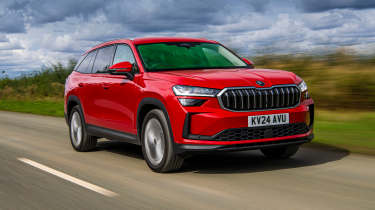
- Priced from £42,000
- Maximum pure-electric range: 71 miles
| Pros |
|
| Cons |
|
The Skoda Kodiaq is another one of our favourite family SUVs, being one of those cars that seems able to do just about everything well, from its driving experience to its practicality and understated, handsome looks. The latest model also adds a genuinely luxurious-feeling interior and well judged interior tech with, we’re delighted to see, physical controls on both the steering wheel and dashboard.
It also scores a direct hit as a PHEV thanks to a seriously impressive 71-mile EV range from a 25.7kWh battery. This is achievable in the real world, and if you’re out and about, can be topped up relatively quickly thanks to 50kW fast charging.
The Skoda will be a popular choice as a company car too, because its 11g/km CO2 emissions and EV range of 70-plus miles mean a BiK rate of only 5 per cent, rising to 6 per cent in 2025/2026. It’s just a shame that to enable this, Skoda has had to sacrifice a seven-seat option, though the flip side to this is a vast 745-litre boot.
“If you’re able to keep the battery topped up, then there’s a high possibility that you could cover a day’s driving on electricity alone, although it’s reassuring to know that it’s backed up by the petrol engine.” –Dean Gibson, senior test editor.
Skoda Kodiaq reviewSkoda Kodiaq deals
5. BMW 330e
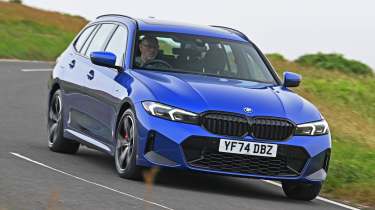
- Prices from £47,200
- Maximum pure-electric range: 62 miles
- Best driving experience
| Pros |
|
| Cons |
|
It may not be the most futuristic or innovative car on the road these days, but the BMW 3 Series is a brilliant all-rounder, with the plug-in hybrid 330e serving as the top choice in the range for company car drivers.
The 330e is just as enjoyable and engaging to drive as any other 3 Series, with its 2.0-litre four-cylinder petrol engine and electric motor working in harmony to deliver plenty of pace.
If you’re eyeing up the 330e as a potential family car, the good news is that the cabin and boot aren’t really intruded on by the PHEV powertrain’s components. Four tall adults will be able to sit comfortably in the BMW’s plush seats, and with 375 litres of boot space on offer, you'll be able to load up the weekly shop without any complaints.
“The BMW 3 Series – and in particular this 330e plug-in hybrid – really does represent the best of both worlds for those wanting to dip their toe into the world of electrification (and save on their tax bill)” –Richard Ingram, deputy editor.
BMW 3 Series reviewBMW 3 Series deals
6. Toyota Prius
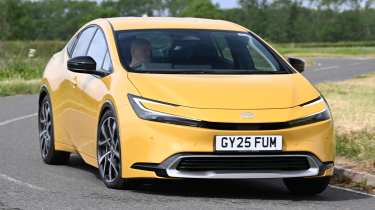
- Prices from £37,900
- Maximum pure-electric range: 53 miles
| Pros |
|
| Cons |
|
The Toyota Prius has been offered with PHEV technology since its third generation, but in the UK the latest version of Toyota’s seminal hybrid is plug-in hybrid only. We’re not complaining though, because while a regular hybrid would surely be pretty efficient on its own, the latest model uses its larger battery to good effect.
Not just in terms of efficiency either, though there’s the usual caveat to give on claimed economy of well over 500mpg: you’ll need to maximise your time in pure EV mode for figures like that, and the Prius will happily do a real-world 40 miles or so between charges. But the plug-in is also the most potent Prius offered worldwide, with 220bhp at its disposal, for genuinely quick performance – 0-62mph comes up in only 6.8 seconds.
It’s pretty good in the corners too, certainly compared to previous versions of the Prius, and while it has some of the same compromises - such as an unusual and not always intuitive dashboard layout, and reduced practicality thanks to the sloping roof - excellent real-world efficiency and Toyota’s reputation for longevity more than make up for it.
“You’re unlikely to get close to the headline 564.9mpg, but you should still manage to achieve better fuel economy figures than you could in a traditional petrol or diesel car – we saw more than 80mpg even when the car’s battery was depleted” – Alex Ingram, chief reviewer, road-tested the Prius in the UK.
Toyota Prius reviewToyota Prius deals
7. Hyundai Tucson PHEV
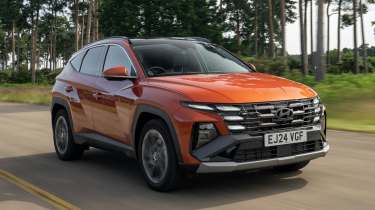
- Prices from £39,400
- Maximum pure-electric range: 43 miles
- Best for families
| Pros |
|
| Cons |
|
It’s no secret that we’re big fans of the Hyundai Tucson, as this distinctive family car has bagged our Mid-size SUV of the Year award for four years in a row at the New Car Awards. Not only does it look like a far more expensive car on the outside, but the Tucson’s on-board kit and build quality are right up there with the best.
Combine everything that makes the Hyundai Tucson such a talented family SUV with a plug-in hybrid powertrain, and it’s naturally a very attractive package. A turbocharged 1.6-litre four-cylinder petrol engine is paired with an electric motor and 13.8kWh battery, with buyers able to opt for either two or four-wheel drive. The PHEV set-up provides up to 43 miles of pure-electric driving plus CO2 emissions as low as 29g/km.
The plug-in hybrid is the heaviest version of the Tucson by far, but also the most powerful with 249bhp and 304Nm on tap. Compared to those other variants, the PHEV accelerates quicker and much more spritely, while its pure-electric driving abilities also make it particularly well suited for around town.
“Efficiency-boosting hybrid technology and high levels of standard equipment can be found throughout the range, while the interior is one of the roomiest in the class and the boot is large enough to rival those of estate cars.” – Ellis Hyde, news reporter.
Hyundai Tucson reviewHyundai Tucson deals
8. Volkswagen Tayron
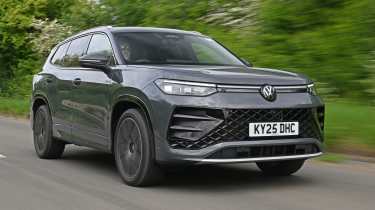
- Prices from £44,000
- Maximum pure-electric range: 74 miles
- Best for families
| Pros |
|
| Cons |
|
The plug-in hybrid Volkswagen Tayron makes a compelling case for itself in the increasingly-competitive plug-in hybrid SUV class, combining a comfortable ride, lots of space and up to 74 miles of all-electric range from its slick hybrid powertrain. That should be more than enough for most people's daily commute plus the school run.
The big, rather imposing family SUV shouldn’t cost an arm or a leg to run, either, because we managed to see a fuel efficiency figure of almost 100mpg when we drove the plug-in hybrid version on its international launch over different types of roads.
On the inside, the Tayron should be able to withstand family life quite well. Volkswagen has reverted to using proper physical buttons and dials in places, but when you do need to dig around in infotainment menus, the system is easy to navigate. The Tayron feels well screwed together and material quality is good overall, although in some areas trim pieces do feel a little flimsy. A problem the closely-related Skoda Kodiaq doesn’t seem to suffer with.
Practicality is where the Tayron shines. The rear door openings are nice and wide, and the adjustable backrests and easily accessible ISOFIX points are a plus point when fitting a child seat. There are plenty of deep storage bins dotted around the cabin and the 705-litre boot can easily swallow luggage, pushchairs and other large, bulky items which come in tow with a family. Sadly though, if you get the Tayron as a plug-in hybrid, it only comes with five seats, rather than seven.
“If you run the battery down to below 15 per cent capacity in the Tayron, the PHEV’s electronics will favour petrol power to save the charge. Handily, there’s a fairly nippy (for a plug-in hybrid) 40kW recharge rate.” - Alastair Crooks, senior news reporter.
Volkswagen Tayron reviewVolkswagen Tayron deals
9. Toyota RAV4
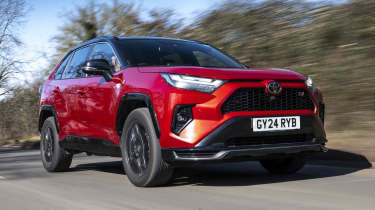
- Prices from £44,400
- Maximum pure-electric range: 46 miles
| Pros |
|
| Cons |
|
Toyota was a pioneer for mainstream hybrid power, and while full-hybrids are what the brand tends to be associated with, it also knows a thing or two about PHEV technology. The internationally best-selling Toyota RAV4 is now only offered in the UK with plug-in hybrid power, with the Japanese brand claiming it can deliver up to 282.4mpg. While it’s unlikely that you’ll see this in the real world, we still managed well over 60mpg when living with the RAV4 as part of our long-term test fleet. It’ll also cover up to 46 miles in pure-electric mode, has a good amount of power and handle surprisingly well.
However, in case you missed the news, the new sixth-generation RAV4 has already been unveiled and is due to go on sale in the UK early next year. It features an even more bold design, slicker on-board tech and its PHEV set-up will offer up to 62 miles of pure-electric driving. So unless you find an absolutely stonking deal on the out-going model, then you may want to avoid buying this dead duck.
If not, the interior is rather conservative, but all the essential tech is up-to-date and straightforward to use. Toyota has a solid reputation for build quality, too, and the RAV4 was highly regarded in the latest Driver Power survey.
“The 0-62mph time is a hot hatch-rivalling six seconds exactly, although the tall body and the way the powertrain delivers this acceleration means it doesn’t feel particularly sporty.” – Dean Gibson, senior test editor.
Toyota RAV4 review Toyota RAV4 deals
10. Suzuki Across
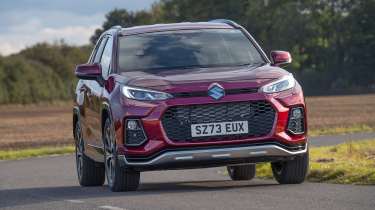
- Prices from £49,700
- Maximum pure-electric range: 46 miles
| Pros |
|
| Cons |
|
The Suzuki Across is basically a rebadged Toyota RAV4 PHEV, which means it’s also going to be outdated by this time next year as the next iteration of its nearly identical sister car arrives. But the Suzuki has always been about getting more for your money because while it’s more expensive to buy as a cash purchase than the Toyota, there are some very tempting leasing deals to be found. And though it may wear a different badge, the Across is just as quick, well built, easy to live with and spacious as the Toyota, plus offers the same 46-mile pure-electric range.
Just one trim level means standard kit is generous, while the powertrain sees a 2.5-litre four-cylinder petrol engine linked to a CVT automatic gearbox, with an 18.1kWh battery pack feeding an electric motor on each axle. As you might imagine, quality and driver appeal, plus cabin space and of course the feel and function of its plug-in setup, are all nigh-on identical to the Toyota.
“The RAV4 is a car we like, so much of that fondness carries over to the Across. Quality inside is good with nice soft-touch plastics where you want them most and everything screwed together well – as you’d expect from a car built by Toyota.” – Steve Fowler, Auto Express contributor.
Suzuki Across reviewSuzuki Across deals
How we choose the best plug-in hybrid cars
We pay particular attention to running costs and real-world efficiency because these are strong motivational factors for buyers in this PHEV segment.
As it's typically larger cars we also pay closer attention to space and practicality in the cabin and the boot area, which can sometimes be compromised by the addition of the large battery pack.
A good plug-in hybrid will also transition seamlessly between the electric power source and the engine, offering quick responses and strong performance. The inevitable extra weight of the complex battery and engine combination shouldn’t be too evident in the way the car corners and rides over bumps.
PHEV FAQs
Is a plug-in hybrid right for me?
To make the most of having a plug-in hybrid, owners need to charge them regularly either at home or at work.
If you never exceed the electric range of a PHEV you will never use any fuel but once the battery is depleted on longer journeys, efficiency is likely to be worse than in an equivalent petrol car. That makes PHEVs a very cost effective option if you do lots of short trips with the occasional longer journey of 100 miles or more thrown in. If you rarely do longer journeys and have easy access to charging, a pure EV is worth considering. If you don’t have access to easy charging, do lots of long distance miles, a full hybrid or mild hybrid may prove cheaper to run.
Which is the safest plug-in hybrid?
There’s no simple answer to that particular question. For starters, every single one of the cars in our best plug-in hybrid rankings that has been crash tested by industry experts, Euro NCAP, have received the maximum five-star rating. The Toyota Prius is the only car that we don’t have an official safety score for yet, but considering the Japanese brand’s reputation for reliability and the amount of standard safety kit it gets, we think a five-star rating is a pretty safe bet.
Which plug-in hybrid holds its value best?
According to our latest expert data, the Land Rover Defender 110 P300e is the plug-in hybrid that holds onto the most of its original value after three years of ownership and 36,000 miles covered. As much as 68% of its sticker price in fact, depending on the exact specification. Meanwhile the DS9 and Vauxhall Astra PHEV depreciate the most, retaining as low as 29per cent after the same period of ownership.
Best plug-in hybrid car deals

